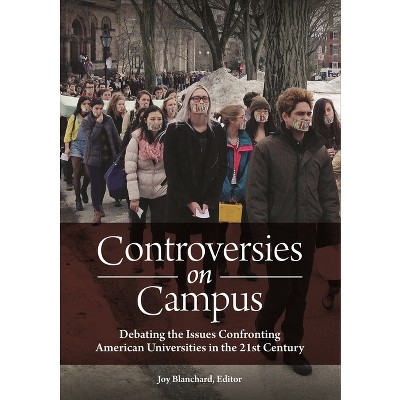Invisible Victims - (Controversies in Science) by Frederick R Lynch (Hardcover)

About this item
Highlights
- Lynch's passionately argued book asks: How did controversial social policy that lacked public support nonetheless become institutionalized?
- About the Author: FREDERICK R. LYNCH is Senior Research Associate at the Salvatori Center, Claremont McKenna College in Claremont, CA.
- 253 Pages
- Social Science, Discrimination & Race Relations
- Series Name: Controversies in Science
Description
About the Book
Lynch's passionately argued book asks: How did controversial social policy that lacked public support nonetheless become institutionalized? The social policy Lynch examines is affirmative action. . . . Lynch condemns the sloppy, fearful thinking that has converted affirmative action into quotas and that has kept social researchers shying away from this explosive topic. Choice
Anyone interested in race relations and sex roles in the United States must read this book.
Social Forces
More and more questions have surfaced in the past decade concerning the wisdom and fairness of affirmative action programs. In this book, Lynch takes a hard look at affirmative action policy development and the social and ethical implications of a system that promotes gender and race as criteria for vocational advancement and educational opportunity. He focuses on the experiences of white males who have been victims of reverse discrimination under such programs and explores the lackluster response from government, the media, and employing institutions. Lynch examines the political taboo that for two decades effectively stifled discussion of the issues that affirmative action raises in both public discourse and scholarly analysis. He reviews the original ideals and purposes of affirmative action and contrasts them with the program as it has actually operated in everyday work settings. In case studies based on interviews and other data, Lynch assesses the reactions of white males to affirmative action barriers, as well as their impact on co-workers, friends, and relatives. He describes the role of the mass media, the social sciences, and ideological elites in creating a conspiracy of silence concerning the hidden and unintended consequences of affirmative action policies. The only study that deals specifically with the impact of affirmative action on white males, this book will appeal to academic and general readers with an interest in public policy, law, political science, sociology, and social psychology.
Book Synopsis
Lynch's passionately argued book asks: How did controversial social policy that lacked public support nonetheless become institutionalized? The social policy Lynch examines is affirmative action. . . . Lynch condemns the sloppy, fearful thinking that has converted affirmative action into quotas and that has kept social researchers shying away from this explosive topic. Choice
Anyone interested in race relations and sex roles in the United States must read this book.Social Forces More and more questions have surfaced in the past decade concerning the wisdom and fairness of affirmative action programs. In this book, Lynch takes a hard look at affirmative action policy development and the social and ethical implications of a system that promotes gender and race as criteria for vocational advancement and educational opportunity. He focuses on the experiences of white males who have been victims of reverse discrimination under such programs and explores the lackluster response from government, the media, and employing institutions. Lynch examines the political taboo that for two decades effectively stifled discussion of the issues that affirmative action raises in both public discourse and scholarly analysis. He reviews the original ideals and purposes of affirmative action and contrasts them with the program as it has actually operated in everyday work settings. In case studies based on interviews and other data, Lynch assesses the reactions of white males to affirmative action barriers, as well as their impact on co-workers, friends, and relatives. He describes the role of the mass media, the social sciences, and ideological elites in creating a conspiracy of silence concerning the hidden and unintended consequences of affirmative action policies. The only study that deals specifically with the impact of affirmative action on white males, this book will appeal to academic and general readers with an interest in public policy, law, political science, sociology, and social psychology.
Review Quotes
"A well-documented, ground-breaking, courageous book."- Warren Farrell, Ph.D. Author, Why Men Are the Way They Are
"Anyone seriously interested in race relations and sex roles in the United States must read this book."- William Beer Social Forces
"In making highly visible the invisible victims, Lynch succeeds brilliantly in lighting up the Byzantine recesses of the federal bureaucracy. A good subtitle would be: How the old inequality has been replaced by the new inequality."- Robert Nisbet Albert Schweitzer Professor, Emeritus Columbia University
"Lynch condemns the sloppy, fearful thinking that has converted affirmative action into quotas and that has kept social researchers shying away from this explosive topic."- Shulamit Reinharz Choice
"There is nothing quite like Frederick Lynch's book which describes how affirmative action works in real life, and points to some very disturbing effects. This is a subject that should be discussed not only in the Supreme Court and Lynch makes an important contribution to that discussion."-Nathan Glazer Professor of Education and Sociology Harvard University
"This excellent book is about real rather than potential victims, those who have suffered directly because racial preferences have disrupted or ended their careers. It is quite right to term them invisible....They are ordinary citizens, done in by their betters, swept aside coolly yet self-righteously in the service of a regnant cliche of the moment."- Joseph Adelson Professor of Sociology University of Michigan
?Lynch's passionately argued book asks: How did controversial social policy that laced public support nonetheless become institutionalized? The social policy Lynch examines is affirmative action. Lynch uses sociological concepts to account for the persistence of affirmative action, but also blames sociology for contributing to its support. This, his book is as much an indictment of sociology as it is an indictment of how our country has recently dealt with overcoming discrimination. The book contains seven tables, synopses of interviews with 32 white males, six appendixes include reverse discrimination accounts, ' the interview schedule used in the research, and documents about affirmative action procedures in colleges and universities. Throughout the book, Lynch illustrates his points with quotations from people he interviewed or from newspaper clippings and court records. Lynch condemns the sloppy, fearful thinking that has converted affirmative action into quotas and that has kept social researchers shying away from this explosive topic. College, university, and public libraries.?-Choice
"Lynch's passionately argued book asks: How did controversial social policy that laced public support nonetheless become institutionalized? The social policy Lynch examines is affirmative action. Lynch uses sociological concepts to account for the persistence of affirmative action, but also blames sociology for contributing to its support. This, his book is as much an indictment of sociology as it is an indictment of how our country has recently dealt with overcoming discrimination. The book contains seven tables, synopses of interviews with 32 white males, six appendixes include reverse discrimination accounts, ' the interview schedule used in the research, and documents about affirmative action procedures in colleges and universities. Throughout the book, Lynch illustrates his points with quotations from people he interviewed or from newspaper clippings and court records. Lynch condemns the sloppy, fearful thinking that has converted affirmative action into quotas and that has kept social researchers shying away from this explosive topic. College, university, and public libraries."-Choice
About the Author
FREDERICK R. LYNCH is Senior Research Associate at the Salvatori Center, Claremont McKenna College in Claremont, CA. He is the author of numerous articles on affirmative action and other social issues in scholarly journals and popular publications, includingShipping details
Return details
Trending Non-Fiction











